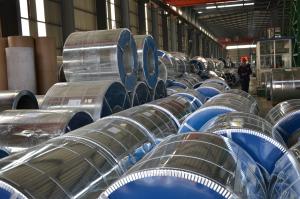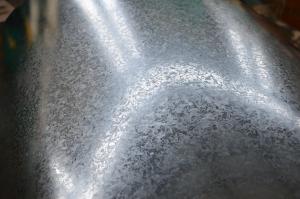galvanized steel coils
- Loading Port:
- China Main Port
- Payment Terms:
- TT OR LC
- Min Order Qty:
- -
- Supply Capability:
- -
OKorder Service Pledge
Quality Product, Order Online Tracking, Timely Delivery
OKorder Financial Service
Credit Rating, Credit Services, Credit Purchasing
You Might Also Like
1) Quality Standard & Grade: JIS G3302, SGCC / ASTM 653M CQ/ EN10142 DX51D+Z
2) Thikness tolerance: +/-0.02mm Width tolerance:+/0.02mm
3) Zinc coating weight: 50g/m2
4) WEIGHT OF PER COIL: 3-5MT
5)Technology: cold rolled
6) Surface of Product: regular spangle / big spangle/ small spangle; Surface Treatment: chromated , non oiled, skin passed
7) Packing: export standard packing,packed with moisture resistant paper and metal
wrapping,securely tied for export,on metal skids7) Country of Origin :
SIZE:0.13*750
- Q:I live in the Black Hills and I need to re-side my cottage. I like the look of vinyl. I've heard pros and cons about both steel and vinyl. Is steel really that easy to dent? It just doesn't look as 'clean' as vinyl. Also what 3 color combos do you like? My cottage has shutters.
- I'd like to know why you need to re-side it. I would get vinyl because it will not need painting as soon as steel.
- Q:Obviously this is an easy question for anyone who works with metal. However, I am currently writing a book and had an idea that had to do with these two metals. Is it possible for gold to be folded into steel while it is being forged? Do 3-metal alloys exist? If this is not possible with current metal-working techniques and technology, what would be needed to make it possible? And finally, what exactly would the mixing of these two yield? A weak metal? A brittle metal? How would it compare to iron or gunmetal? If you have no idea, please offer speculations. Thank you!
- Not okorder /
- Q:density of mild steel (MS) is 7850 KG per metre cube , but i want to know the density of stainless steel
- This Site Might Help You. RE: what is the density of stainless steel? density of mild steel (MS) is 7850 KG per metre cube , but i want to know the density of stainless steel
- Q:I'm getting new strings on my dad's old acoustic guitar so I can learn how to play it and I'm wondering if I should get nylon or steel strings. Are there any major differences between the two aside from the nylon strings being easier on your fingers? Like do the Nylon strings sound different?
- Well there definitely is a difference in sound. It kind of depends on what type of music you're getting into. If you what to play more pop/rock songs I'd go with steel. But for classical guitar or folk music, go with the nylon.
- Q:I bought a stainless steel mood ring two days ago, but would it rust?Thanks in advance!
- Stainless Steel does not rust...that is why it is used in our kitchens and the top kitchens of the world...!! sorry...Stainless Steel does not Tarnish either!
- Q:On a fixie frame what should i get an aluminum frame or a steel frame
- Aluminum Fixie
- Q:A steel rod AISI 1040 has the ultimate tensile strength Sut of 113 kpsi. Determine the rotating bending specimen's endurance limit S'e at 10 to the 6th cycles.
- A rule of thumb for endurance limits of steel with Sut 200 ksi is that S'e = 0.504 x Sut, thus for your case that would be 113 x .504 = 56.95 ksi (endurance limit is defined as fatigue life greater than 10^6 cycles)
- Q:No. Not Stainless steel, I mean STEEL.Not a specific type, but STEEL.Thanks. xo
- Steel is mostly iron. However, it is an alloy or solid solution, or mixture of iron and other metals or sometimes carbon. All steel is a mixture. there are many varieties.
- Q:What are the dimensions of a steel coil?
- The dimensions of a steel coil can vary depending on its intended purpose and specifications. However, typical dimensions can range from 0.15mm to 10mm in thickness, and from 600mm to 2,000mm in width. The length of a steel coil can vary as well, typically ranging from 1,500mm to 6,000mm.
- Q:How are steel coils used in the production of bridges and infrastructure?
- Steel coils are an essential component in the production of bridges and infrastructure. These coils are made from steel, which is a strong and durable material that can withstand heavy loads and harsh environmental conditions. In bridge construction, steel coils are used to manufacture the structural components such as beams, girders, and columns. These components provide the necessary strength and support to the bridge, allowing it to carry the weight of vehicles, pedestrians, and other loads. Steel coils are rolled into the desired shape, cut to the required length, and then welded or bolted together to create these structural elements. Additionally, steel coils are also used in the fabrication of bridge decks, which are the roadways or walkways on the bridge. These coils are processed to form steel plates, which are then assembled and secured onto the bridge structure. The steel plates provide a smooth and durable surface for vehicles and pedestrians to travel on. In terms of infrastructure, steel coils play a vital role in the construction of various structures such as buildings, stadiums, and industrial facilities. They are used to fabricate the primary support systems, including columns, beams, and trusses, which provide the necessary strength and stability to these structures. Steel coils are also used to create roofing and cladding systems, ensuring protection against weather elements and enhancing the overall aesthetics of the infrastructure. Furthermore, steel coils are often used in the production of reinforcing bars, commonly known as rebar. Rebar is essential for reinforcing concrete structures such as foundations, walls, and slabs. These coils are processed into various sizes and shapes, and then embedded within the concrete to increase its tensile strength and prevent cracking or collapsing under heavy loads. Overall, steel coils are a critical component in the production of bridges and infrastructure. Their strength, durability, and versatility make them an ideal material for constructing safe and reliable structures that can withstand the test of time.
1. Manufacturer Overview |
|
|---|---|
| Location | |
| Year Established | |
| Annual Output Value | |
| Main Markets | |
| Company Certifications | |
2. Manufacturer Certificates |
|
|---|---|
| a) Certification Name | |
| Range | |
| Reference | |
| Validity Period | |
3. Manufacturer Capability |
|
|---|---|
| a)Trade Capacity | |
| Nearest Port | |
| Export Percentage | |
| No.of Employees in Trade Department | |
| Language Spoken: | |
| b)Factory Information | |
| Factory Size: | |
| No. of Production Lines | |
| Contract Manufacturing | |
| Product Price Range | |
Send your message to us
galvanized steel coils
- Loading Port:
- China Main Port
- Payment Terms:
- TT OR LC
- Min Order Qty:
- -
- Supply Capability:
- -
OKorder Service Pledge
Quality Product, Order Online Tracking, Timely Delivery
OKorder Financial Service
Credit Rating, Credit Services, Credit Purchasing
Similar products
New products
Hot products
Related keywords




























